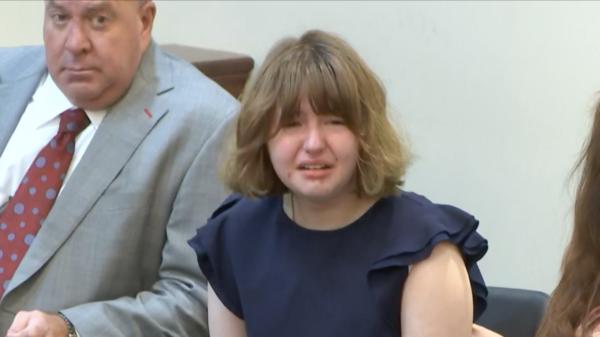Carly Gregg, the 15-year-old Mississippi girl sentenced to life in prison for murdering her mother and attempting to kill her stepfather, is appealing her conviction. Her attorney filed a motion on September 26, 2024, citing new evidence of undiagnosed mental illness and a series of alleged errors during the trial that she claims prejudiced the jury.
The jury deliberated for less than an hour before finding Gregg guilty of murder, attempted murder, and tampering with evidence. The swift verdict and life sentence shocked many, raising questions about the fairness of the proceedings. The defense argued throughout the trial that Gregg was legally insane at the time of the crime, suffering from an undiagnosed mental illness.
 Carly Gregg cries in courtCarly Gregg reacts to the guilty verdict on September 20, 2024. (Court TV)
Carly Gregg cries in courtCarly Gregg reacts to the guilty verdict on September 20, 2024. (Court TV)
New Evidence of Auditory Hallucinations
The appeal motion reveals compelling new evidence supporting the defense’s insanity claim. Following the trial, Gregg’s biological father, Kevin Gregg, revealed in a WLBT interview that his daughter experienced auditory hallucinations as a child and received equine therapy as treatment. This crucial information was not presented during the trial as Kevin Gregg refused to cooperate with the defense, prosecution, or mental health professionals involved in the case. The defense argues that this previously undisclosed evidence significantly bolsters their argument for insanity and warrants a new trial.
Questionable Testimony and “Crime and Punishment”
The appeal also challenges the relevance and potential prejudicial impact of testimony from Dr. Rebecca Kirk, Gregg’s former counselor and a prosecution witness. The prosecution questioned Kirk about notes indicating Gregg’s interest in reading Fyodor Dostoevsky’s “Crime and Punishment.” The defense contends this line of questioning was irrelevant to the case and served only to prejudice the jury, creating an unfair association between Gregg and the novel’s themes of murder and guilt. The motion clarifies that the underlining of the book title in Dr. Kirk’s notes, which the prosecution seemingly interpreted as a point of concern, was merely standard grammatical practice.
“Radical Sanctions” and Discovery Violations
Defense attorney Bridget Todd further argues that Judge Dewey K. Arthur imposed “radical sanctions” on the defense team for alleged discovery violations. These sanctions included excluding two witnesses and limiting the testimony of others, which the defense believes significantly hampered their ability to present a complete and effective defense. The judge’s actions, described by the defense as “bushwhacking,” are now under scrutiny as part of the appeal process.
Jury Composition and the Defendant’s Age
The appeal also raises concerns about the jury’s composition, specifically regarding the age disparity between Gregg and the jurors. Mississippi law requires jurors to be at least 21 years old, meaning Gregg, at 15, was significantly younger than the individuals deciding her fate. The defense argues that this age difference creates a fundamental conflict in Mississippi law, which recognizes the maturity of a 14 or 15-year-old to understand legal proceedings and face adult sentences, yet deems them too young to serve on a jury. This discrepancy, the defense claims, raises questions about whether Gregg was judged by a jury of her peers.
Expert Testimony and Mental Illness
During the trial, psychiatrist Dr. Andrew Clark, testifying for the defense, diagnosed Gregg with an unspecified schizophrenic disorder. This diagnosis, coupled with the newly revealed evidence of past auditory hallucinations, forms the core of the defense’s argument for insanity. They contend that Gregg’s mental state at the time of the crime should mitigate her culpability.
The Path Forward
The appeal motion highlights several key issues that the defense believes warrant a new trial or a complete overturning of the verdict and sentence. The new evidence of Gregg’s childhood auditory hallucinations, the questionable relevance of the “Crime and Punishment” testimony, the impact of the court’s sanctions, and the jury composition all contribute to a complex legal landscape surrounding this case. No hearing date has yet been set for the appeal. The outcome of this appeal will have significant implications for Carly Gregg’s future and will likely spark continued debate about the complexities of juvenile justice, mental health, and the legal system.
Conclusion
Carly Gregg’s appeal presents a complex legal challenge, raising critical questions about the fairness of her trial and the adequacy of her defense. The new evidence of her prior mental health struggles adds a significant layer to the case, potentially impacting the court’s understanding of her actions. The issues raised in the appeal, including the prosecution’s line of questioning regarding “Crime and Punishment” and the sanctions imposed on the defense, warrant careful consideration. The appeal’s outcome will undoubtedly shape not only Gregg’s future but also the broader conversation surrounding juvenile justice and mental health within the legal system. Will the court grant her a new trial, or will her life sentence remain? The legal community and the public await the court’s decision with bated breath.